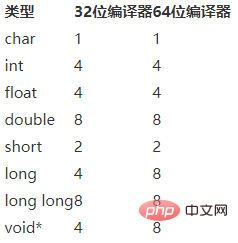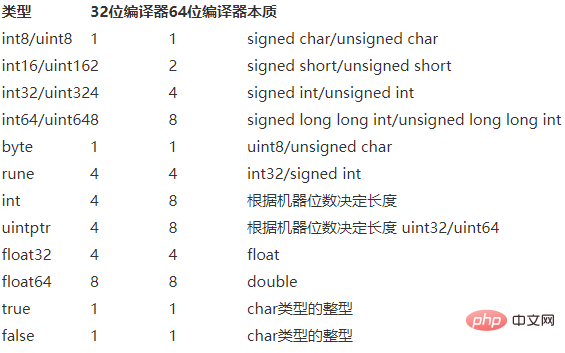What is the difference between golang and C language?
The difference between golang and C language: 1. Golang is an object-oriented programming language, while C language is a process-oriented programming language; 2. Golang manages code through packages, while C language uses files to manage code; 3. There are 25 keywords in golang, while there are 32 keywords in C language; 4. The memory occupied is different; 5. The formats for defining constants and variables are different; 6. Golang introduces garbage collection The mechanism will automatically manage memory, while C language requires manual management of memory and so on.

The operating environment of this tutorial: Windows 10 system, GO version 1.20, Dell G3 computer.
Go (also known as Golang) is a statically strongly typed, compiled, concurrent programming language with garbage collection capabilities developed by Google.
Go's syntax is close to C language, but the declaration of variables is different. Go supports garbage collection. Go's parallel model is based on Tony Hall's Communicating Sequential Process (CSP). Other languages that adopt a similar model include Occam and Limbo, but it also has features of Pi operations, such as channel transmission. Plugin support is opened in version 1.8, which means that some functions can now be dynamically loaded from Go.
C language is a process-oriented, abstract, general-purpose programming language that is widely used in low-level development. C language can compile and process low-level memory in a simple way. C language is an efficient programming language that only generates a small amount of machine language and can run without any operating environment support. Although the C language provides many low-level processing functions, it still maintains cross-platform characteristics. C language programs written in a standard specification can be executed on many computer platforms including operating platforms such as embedded processors and supercomputers. Compile.
The difference between go and c language
1. C language is a process-oriented programming language, while golang is an object-oriented programming language ;
2. In C language, code is managed through files, while in Go language, code is managed through packages.
3. There are a total of 32 keywords in C language, a total of 25 keywords in Go language, etc.
4. Different memory occupations
Each data type in C language occupies memory space

Go Each data type of the language occupies memory space

5. Comparison of constant variables
C language definition of constant and variable format
数据类型 变量名称 = 值;<br/>const 数据类型 常量名称 = 值;<br/>
Go language defines constant and variable formats
In addition to the following standard formats, Go language also provides several simple syntactic sugars
var 变量名称 数据类型 = 值;<br/>const 变量名称 数据类型 = 值;<br/>
6. Memory management
C language requires programmers to manually manage memory, including allocation and release. If programmers do not manage memory properly, problems such as memory leaks or dangling pointers may easily occur. The Go language introduces a garbage collection mechanism to automatically manage memory and avoid many such problems. Programmers do not need to worry about memory allocation and release issues and can better focus on writing business code. At the same time, the Go language has also optimized memory allocation. Through mechanisms such as caching, memory can be allocated and recycled faster, improving program performance.
7. Concurrent programming
Go language is naturally suitable for concurrent programming. It has built-in goroutine and channel, which can transfer data between different goroutines. These features allow programmers to easily write concurrent programs while ensuring program stability. Of course, C language can also perform concurrent programming, but it requires manual management of threads and locks, which is too cumbersome and complicated.
8. Syntax type
C language is a statically typed language, and the type of variables needs to be determined at compile time. The Go language is a dynamically typed language that can dynamically determine the type of variables at runtime. This makes the Go language more flexible, but it is also prone to type errors and requires developers to write code very carefully.
10. Coding style
The coding style of C language is relatively unique. Braces are generally used to enclose code blocks, and then line breaks are indented. The Go language pays more attention to the simplicity and readability of the code. Code blocks are represented by indentation, and there are also some syntactic sugars to simplify code writing. At the same time, the Go language also has its own naming convention, which can reduce naming conflicts among programmers.
In short, although C language is more traditional than Go language in many aspects, some features of Go language are indeed very suitable for modern software development. By comparing Golang with C, we believe readers have been able to better understand the differences between them. No matter which language we choose, we should choose it based on specific needs, rather than blindly pursuing the trend of a language.
The above is the detailed content of What is the difference between golang and C language?. For more information, please follow other related articles on the PHP Chinese website!

Hot AI Tools

Undresser.AI Undress
AI-powered app for creating realistic nude photos

AI Clothes Remover
Online AI tool for removing clothes from photos.

Undress AI Tool
Undress images for free

Clothoff.io
AI clothes remover

AI Hentai Generator
Generate AI Hentai for free.

Hot Article

Hot Tools

Notepad++7.3.1
Easy-to-use and free code editor

SublimeText3 Chinese version
Chinese version, very easy to use

Zend Studio 13.0.1
Powerful PHP integrated development environment

Dreamweaver CS6
Visual web development tools

SublimeText3 Mac version
God-level code editing software (SublimeText3)

Hot Topics
 1377
1377
 52
52
 C language data structure: data representation and operation of trees and graphs
Apr 04, 2025 am 11:18 AM
C language data structure: data representation and operation of trees and graphs
Apr 04, 2025 am 11:18 AM
C language data structure: The data representation of the tree and graph is a hierarchical data structure consisting of nodes. Each node contains a data element and a pointer to its child nodes. The binary tree is a special type of tree. Each node has at most two child nodes. The data represents structTreeNode{intdata;structTreeNode*left;structTreeNode*right;}; Operation creates a tree traversal tree (predecision, in-order, and later order) search tree insertion node deletes node graph is a collection of data structures, where elements are vertices, and they can be connected together through edges with right or unrighted data representing neighbors.
 The truth behind the C language file operation problem
Apr 04, 2025 am 11:24 AM
The truth behind the C language file operation problem
Apr 04, 2025 am 11:24 AM
The truth about file operation problems: file opening failed: insufficient permissions, wrong paths, and file occupied. Data writing failed: the buffer is full, the file is not writable, and the disk space is insufficient. Other FAQs: slow file traversal, incorrect text file encoding, and binary file reading errors.
 C language multithreaded programming: a beginner's guide and troubleshooting
Apr 04, 2025 am 10:15 AM
C language multithreaded programming: a beginner's guide and troubleshooting
Apr 04, 2025 am 10:15 AM
C language multithreading programming guide: Creating threads: Use the pthread_create() function to specify thread ID, properties, and thread functions. Thread synchronization: Prevent data competition through mutexes, semaphores, and conditional variables. Practical case: Use multi-threading to calculate the Fibonacci number, assign tasks to multiple threads and synchronize the results. Troubleshooting: Solve problems such as program crashes, thread stop responses, and performance bottlenecks.
 How to output a countdown in C language
Apr 04, 2025 am 08:54 AM
How to output a countdown in C language
Apr 04, 2025 am 08:54 AM
How to output a countdown in C? Answer: Use loop statements. Steps: 1. Define the variable n and store the countdown number to output; 2. Use the while loop to continuously print n until n is less than 1; 3. In the loop body, print out the value of n; 4. At the end of the loop, subtract n by 1 to output the next smaller reciprocal.
 CS-Week 3
Apr 04, 2025 am 06:06 AM
CS-Week 3
Apr 04, 2025 am 06:06 AM
Algorithms are the set of instructions to solve problems, and their execution speed and memory usage vary. In programming, many algorithms are based on data search and sorting. This article will introduce several data retrieval and sorting algorithms. Linear search assumes that there is an array [20,500,10,5,100,1,50] and needs to find the number 50. The linear search algorithm checks each element in the array one by one until the target value is found or the complete array is traversed. The algorithm flowchart is as follows: The pseudo-code for linear search is as follows: Check each element: If the target value is found: Return true Return false C language implementation: #include#includeintmain(void){i
 C language data structure: the key role of data structures in artificial intelligence
Apr 04, 2025 am 10:45 AM
C language data structure: the key role of data structures in artificial intelligence
Apr 04, 2025 am 10:45 AM
C Language Data Structure: Overview of the Key Role of Data Structure in Artificial Intelligence In the field of artificial intelligence, data structures are crucial to processing large amounts of data. Data structures provide an effective way to organize and manage data, optimize algorithms and improve program efficiency. Common data structures Commonly used data structures in C language include: arrays: a set of consecutively stored data items with the same type. Structure: A data type that organizes different types of data together and gives them a name. Linked List: A linear data structure in which data items are connected together by pointers. Stack: Data structure that follows the last-in first-out (LIFO) principle. Queue: Data structure that follows the first-in first-out (FIFO) principle. Practical case: Adjacent table in graph theory is artificial intelligence
 Troubleshooting tips for processing files in C language
Apr 04, 2025 am 11:15 AM
Troubleshooting tips for processing files in C language
Apr 04, 2025 am 11:15 AM
Troubleshooting Tips for C language processing files When processing files in C language, you may encounter various problems. The following are common problems and corresponding solutions: Problem 1: Cannot open the file code: FILE*fp=fopen("myfile.txt","r");if(fp==NULL){//File opening failed} Reason: File path error File does not exist without file read permission Solution: Check the file path to ensure that the file has check file permission problem 2: File reading failed code: charbuffer[100];size_tread_bytes=fread(buffer,1,siz
 The concept of c language functions and their definition format
Apr 03, 2025 pm 11:33 PM
The concept of c language functions and their definition format
Apr 03, 2025 pm 11:33 PM
C language functions are reusable code blocks, receive parameters for processing, and return results. It is similar to the Swiss Army Knife, powerful and requires careful use. Functions include elements such as defining formats, parameters, return values, and function bodies. Advanced usage includes function pointers, recursive functions, and callback functions. Common errors are type mismatch and forgetting to declare prototypes. Debugging skills include printing variables and using a debugger. Performance optimization uses inline functions. Function design should follow the principle of single responsibility. Proficiency in C language functions can significantly improve programming efficiency and code quality.



